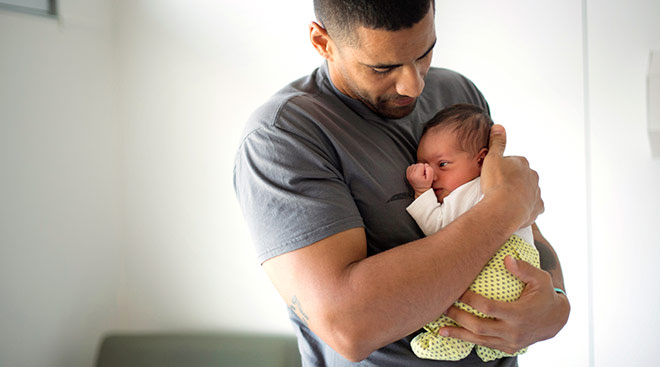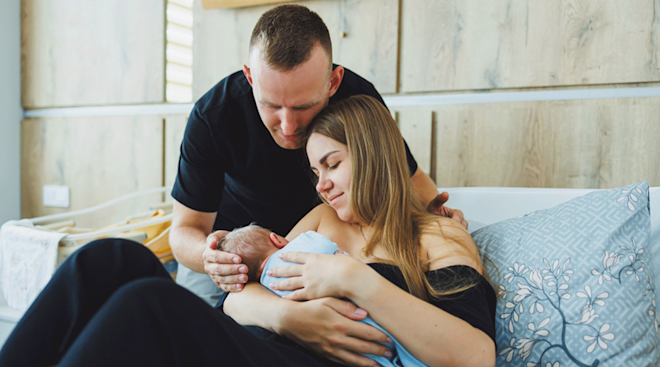Study Shows Which Expectant Dads May Adjust Easier to Fatherhood
It’s natural for first-time expectant parents to wonder how they’ll fare once the baby arrives. According to a new study, a five-minute role-play done with first-time dads-to-be before baby arrives may help predict their parenting.
The study, published in the Journal of Family Psychology, involved researchers visiting the homes of and videotaping 182 expectant fathers during their partner’s third trimester of pregnancy. It’s important to note that these couples are also participants of the New Parents Project, which looks primarily at how highly-educated, dual-earning, heterosexual couples adjust to becoming first-time parents. The New Parents Project is also co-led by Sarah Schoppe-Sullivan, co-author of the study and professor of psychology at Ohio State.
The researchers observed how the men interacted with a doll they were told represented the baby they were about to have and rated them on their levels of “intuitive parenting.” An assistant played the role of a nurse that presented the “baby” to the fathers.
While it may seem silly to have adults play with dolls, it’s easy for them to do, Lauren Altenburger, lead study author and an assistant professor of human development and family studies at Pennsylvania State University-Shenango, stated in the press release. “The birth is right around the corner, so they are already thinking about what it’s going to be like. They took the role playing seriously,” she said.
The custom-made dolls were developed by researchers in Switzerland and had a footed infant sleeper sewn shut with 7 to 8 pounds of rice inside to help the doll’s weight mimic that of a newborn. The doll’s head, made of green fabric, was then sewn onto the sleeper.
Some indicators of intuitive parenting researchers looked for included whether the men talked directly to the doll’s face, used baby talk, smiled and whether they were concerned about the doll’s well-being.
“We were looking for how naturally fathers acted with the baby. Did they hold it properly, smile at it and do things like gently pinching the baby’s foot or other positive behaviors that many people just instinctively do with babies,” Schoppe-Sullivan said.
The researchers’ ratings actually predicted their parenting quality nine months after their child had been born. After nine months, a different group of researchers watched the same fathers interact and play with their babies. They rated the dads based on how well they paid attention to and responded to their baby, how engaged they were and their expression of positive feelings.
“We were able to detect the capacity for positive parenting in these men before they even became fathers,” Altenburger stated. “Those dads who were rated as showing more intuitive parenting skills with the doll a year earlier tended to have a more positive interaction with their real child.”
The study found this to be true even after taking into account other facts that could affect the man’s parenting, including personality traits, their co-parenting relationship with the baby’s mom and the baby’s temperament.
The dads who displayed high-quality parenting skills with their child also usually scored higher when tested on two personality traits: open to new experiences and conscientiousness. Additionally, the researchers found that a positive co-parenting relationship between the mom and dad also helped dads be better parents.
The researchers hope to use their findings to teach intuitive parenting skills. “We can help expectant fathers learn these parenting skills. Not all parents start out knowing how to do these things, but they can be shown how,” Schoppe-Sullivan said. “Although it is called ‘intuitive parenting,’ it isn’t really intuitive for everyone. We need to work with fathers to make sure they know how to be the best fathers they can be.”
Please note: The Bump and the materials and information it contains are not intended to, and do not constitute, medical or other health advice or diagnosis and should not be used as such. You should always consult with a qualified physician or health professional about your specific circumstances.
Navigate forward to interact with the calendar and select a date. Press the question mark key to get the keyboard shortcuts for changing dates.





















































